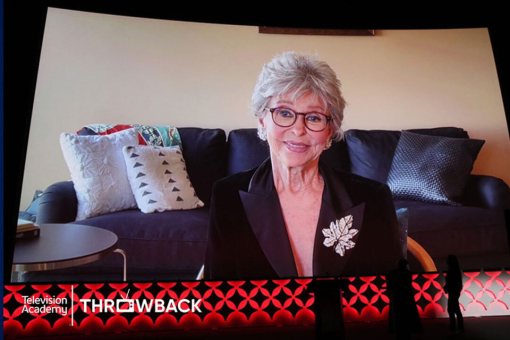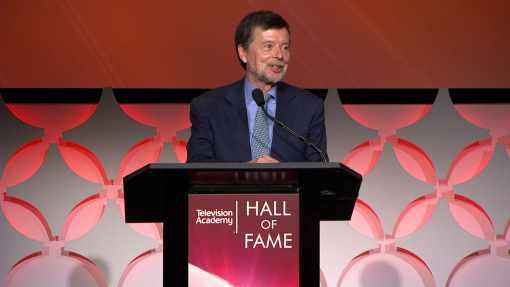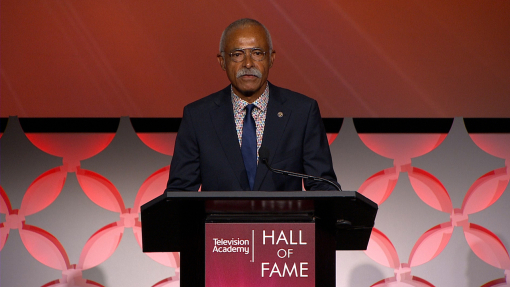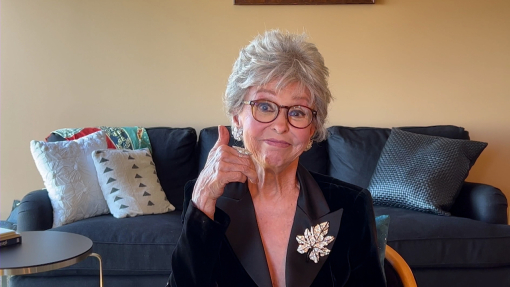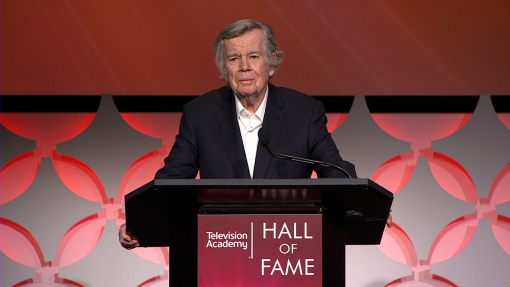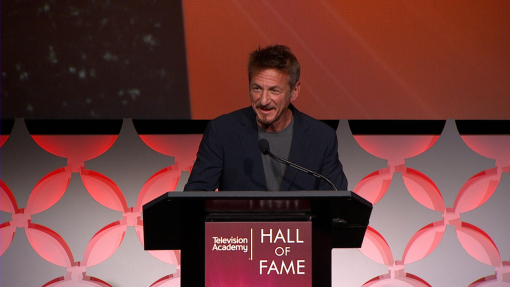It has two heads, four arms, one office, and one mind. It's that rarest of entertainment industry creatures — the genus collaboratus, the Incredible Two-Headed Transplant, yes, it's … Carsey-Werner, one of the most awesome creative forces known to modern television.
How awesome? Consider this: at the age of three, Carsey-Werner got up and rampaged right through TV Sitcom Land and made mincemeat of the thunderous, merciless Ratings Beast — having rallied to its support nothing less than great comic entities called Cosby and Roseanne.
Yes, Carsey-Werner would stop at nothing in its sacred mission — to eliminate frowns, and stamp out cheap laughs in Sitcom Land. And maybe, just maybe, to inspire a little (gasp) constructive thought in the alpha-waved brains of viewers …
Today, having practically co-opted the Ratings Beast into doing its bidding with such potent new allies as Grace Under Fire (with Brett Butler) and Cybill (Shepherd), Carsey-Werner is scouting out newer, greater conquests — in the land of the Feature Film (Polly Platt and Caryn Mandabach are heading up the newly formed Carsey-Werner Moving Pictures). But that's not to suggest complacency. Just to keep that slavering TV Ratings Beast in line, Carsey-Werner has brought back Roseanne for its ninth year — and an all-new assault by Cosby.
How does this half-man, half-woman creature do it? A magic love elixir? Psychic friends? We turn to the female half, known as Marcy Carsey:
"It's great to have somebody that you have to be smart for," she said. “I guess Tom [Werner] is more thoughtful than I am. I tend to shoot from the hip a little bit more. How it works is, if one of us can't prove a point to the other one as to why we should make this deal, or why this idea is going to work as a series, or why this writer would be good for this particular thing ... If one can't make the argument for the other of us, then the one who's trying to make the argument just finally says, ‘Know what? Forget it. I'm wrong.’”
Ah-ha! So the bond between the two halves; the factor in the two parts of the equation, is the humility of compromise? We turn to the male half:
"I think she is the clearest thinker I've ever met, and she has the most extraordinary sense of getting to the heart of the matter," Werner once told the Hollywood Reporter. "She's a heat-seeking missile in her ability to find what's best about an idea and how to improve on it."
Ah-ha! So the bond between the two halves, the factor in the two parts of the equation, is respecting and valuing the other's strengths? Surely it can't be as easy as all that.
"Oh, we had the initial fights any partnership or marriage has about the same issues," said Carsey, from her Los Angeles home. “You have the same two issues you fight about for a few years, and then you get tired of it and you say, ‘Well, screw it. I'm not going to fight them anymore.’ You either split or you work it out.”
But, my God—the same office?
"It's handier because we do so many things together, and we talk about everything all the time, so it's just kind of easier that way."
Marcy Carsey and Tom Werner have worked it out since 1976, when they first merged offices at ABC — and officially since Carsey-Werner was born in 1981. The Werner part of the proposition (frenetic in New York readying the new Cosby, and hence unavailable for interview here) started out as an award-winning documentary producer, most notably for Shirley Chisholm: Pursuing the Dream, a look at the pioneer African-American U.S. congresswoman. A 1971 cum laude graduate of Harvard University, Werner joined ABC as a $150-a-week research analyst (having turned down the job of producer on a new CBS show called 60 Minutes, figuring, like most people, that it wouldn't last). From there it was on to planning and development, and up the corporate ladder to the rung marked "manager of prime time program development, East Coast" by 1975. Which is when he first laid eyes on the woman he would eventually marry — in business, that is.
Was it, er, rapport at first sight? Well, here's one to warm the cockles of feminist hearts: she hired him. She was director of comedy programming, and he became manager of comedy programming. Although it was not until 1981 that they formally became hyphenated, the merger was a de facto reality. They just worked too well together for anyone (especially them) to ignore, as a list of their projects from the era attests: Barney Miller, Soap, Taxi, Dynasty, Mork & Mindy … When asked about the highly successful efforts of this dynamic duo. Carsey is modest: "We were taught really well by Mike Eisner and Freddy Silverman — they were terrific teachers."
The story of Mork & Mindy's genesis is perhaps as revealing of the Tom & Marcy working relationship as it is about the off-the-wall nature of the hit program, which starred (and launched the career of) Robin Williams as the alien-next-door, and Pam Dawber as his protector. Here it is, folks, the secret of how big-time producers come up with successful, original concepts! It came from out of the blue—literally:
"We put it together on a plane to New York, on our way to scheduling meetings," remembered Carsey. “Tommy and I knew we did not have an 8 o'clock hit that season, and ABC thought we did. We had remembered that Garry Marshall had been very excited about the guest shot Robin Williams had done on Happy Days as this alien. We had five hours to think about how we were going to get them an 8 o'clock hit. When we got to New York, we called our promo people, and had them put together some clips of the guest shot that Robin had done on Happy Days, and of our favorite female — somebody we thought could co-star with him.
“Pam Dawber had done another pilot, so we put some footage from that pilot together with some footage of Robin, and had some narration over the whole thing, so it looked like a little pilot presentation, although the two people had never been on the same stage at the same time! We had Garry write this wonderful narration as to what the premise of the series would be … We called Paramount and said, ‘We want to make a series deal,’ and we made up the name of the series — an 8 o'clock series, starring Robin Williams.”
Management was not swayed. Williams was not a household name then — not even a neighborhood name. In a move that speaks volumes about Carsey-Werner's self-confidence, or just plain gumption, Carsey staked her job on Mork. Bear in mind that, at this stage, the series was still a twinkle in the producers' eyes.
"I said, 'Look, I believe in this, and I'm your head of series television,’" Carsey remembered. “If it doesn't work, then you just get somebody else in this job. This is what you're paying me to do. You need an 8 o'clock hit, you don't have one — this can be one. So let's put it on, and if it doesn't work, then you call me crazy and you get somebody else.”
She wasn't called crazy, but Mork & Mindy was — with great affection, by the public and critics alike.
Marcy Carsey has a history of staking a lot on career moves; of following her hunches and instincts. And it's a distinguished history. It begins in Weymouth, Massachusetts — her birthplace — so her first hunch was to get out of Weymouth. ("You had to go seek your fortune," she said, "and you didn't want to seek it in Weymouth.") Next stop: the University of New Hampshire, where she graduated cum laude with a degree in English literature, and half-a-mind to become an actress. "I think," she laughed, “my favorite career of all would have been to become the soubrette in musical comedies — you know, the comedy friend of the lead; the girl who sang [here she half-sings], ‘It ain't so much a question of not knowing what to do’ or ‘Guys and Dolls.’ That's really me.”
But summer stock really wasn't her. For a would-be actress, Carsey was destined to turn into a hell of a TV producer. The first step down the long road was, more or less, a lark. A friend from high school invited her to rendezvous one afternoon in New York City and, almost spur-of-the-moment, invited her to share an apartment. With a why not? attitude, Carsey did — and subsequently beat down doors for "any kind of schlep job" in town, winding up as a tour guide at NBC. (She confesses to "storming" the boss, and repeating "you have to hire me" until he buckled.) This, naturally, was a mere ploy. Every page and tour guide was angling to break into the business — some to become journalists, some, like young Marcy, to work for the Tonight Show. She did, and in short order, found herself helping out the likes of Ed Weinberger and (then-writer) Marshall Brickman come up with interview questions for Jack Paar (we're talking mid-'60s here). She also found herself in love with a Tonight Show associate producer by the name of John Carsey, whom she subsequently married, and followed to Los Angeles when he went for Rowan and Martin's Laugh-In as a joke-writer.
Calling up her English lit skills, Carsey snagged a slot as a story analyst for Tomorrow Entertainment, moved up to executive story editor, then left — quite calculatedly, for a change — in 1974 to join ABC as a program executive. (She was pregnant at the time, incidentally, with the one of her two children, and remains "eternally grateful" to the network for not considering this a drawback.)
"Moving to ABC was one of the few specific decisions I made," she said, “because I really thought a network would be a fun place to work — the hub of the business … I knew I'd be good at it and I knew I was a very hard worker. But I knew that I had no interest or skills in political maneuvering and stuff like that, so either I'd get killed or they'd adore me.”
They adored, and the rest, as they say, is herstory. By 1980, in the wake of Mork & Mindy's success, Carsey followed another hunch and bailed. "Management had changed," she said, "and it just wasn't fun anymore." Her successor? In the words of Woody Woodpecker—guess whoooo? That's right—Tom Werner. Now that's more than enough to break up a friendship, let alone a working relationship. Carsey was philosophical, saying she could understand Werner's wishing to find out "what it's like to be the top person in series television." Yet she yanked on him to come and join her — and yanked and yanked. Eleven months later, Werner caved in. This was no small step for a variety of reasons, not the least of which is that Werner is a family man (he and wife Jill have three kids).
The start was tentative — well, it was horrible. There was a writers' strike and an actors' strike in Carsey-Werner's first year of existence, so there wasn't a whole lot to do. "Honestly," said Carsey, "it was a little bit scary." Still, they had faith;
they knew what they were doing; TV was in their blood. As Werner once told an interviewer, "we really are children of the medium. It was more than just an appliance in my house. I could serenade you with theme songs of shows from the '50s and '60s."
And herein lies what just might be the Man Behind the Carsey-Werner Curtain. Carsey explained, “We had to start as viewers, as part of the audience, and we never lost that kind of respect for the audience … If they embrace the show, it's because we did something right. If they reject the show, it's because we didn't do something right.”
They did a few somethings partly right at the outset — Oh, Madeline (1983, with Madeline Kahn), the movie Single Bars, Single Women ('84), Davis Rules, Frannie's Turn, the critically hailed She TV — but things were financially harrowing. It wasn't until linking up with Bill Cosby that Carsey-Werner found its feet. Who better to be a father figure in the hilarious misadventures of a well-to-do suburban American family — the Nelsons — er, that is, the Huxtables (a well-to-do suburban African-American family) than The Cos? Believe it or not, there was risk; Cosby was not yet a proven TV commodity, what with a couple of modestly successful series behind him (and I Spy way in his past).
"We believed in Bill Cosby," said Carsey. "He was a legend already, and his message was so fabulous. I mean, we just believed in him, heart and soul. When we heard he was available, we knew we wanted to do something with him."
They also believed in Roseanne (Barr, at the time), having discovered the little-known comedienne on the Tonight Show: "Every series we were developing," said Carsey, “we said, ‘Oh, maybe Roseanne Barr could play that part.’ And I think it was Tommy who finally said, ‘You know what? We love her so much why don't we just put her in the middle of a show?’ I went [she inhales deeply], ‘Okay, all right, let's do that!’”
A risk? "Well," Carsey added, "We always take a risk. You don't suddenly get to a position where you can afford to take a risk. You can't afford not to take a risk."
And so they always seem to, with issues regularly framing the comedy: abortion, drugs, spousal abuse, etc. From Another World to Grace Under Fire (the story of a divorcee starting life over again, which debuted as the highest rated new show of its first season) and certainly to the ever-controversial Roseanne, the comedy makes a point of making a point. After all, has any program done more to depict African-Americans as normal Americans with normal aspirations and problems than The Cosby Show? The Carsey-Werner press bio is duly full of what would, in other circumstances, be hollow references to television with "integrity" and "responsibility".
"I'm constantly astonished," said Carsey-Werner President Madabach, who met her bosses at ABC in 1976, at the wisdom and careful attention to humanity they bring to any decision. I could say something incredibly flowery or hyperbolic, but I think it would be most important to emphasize their character because that is reflected in their products.”
All of which, perhaps, leaves one obvious question about these two award-winning (Emmy, People's Choice, Golden Globe, NAACP Image Award, Humanitas, Peabody), remarkable television record-setters (in 1988-89, Cosby, Roseanne and A Different World were 1-2-3 in the ratings.) Or should it be phrased — this four-armed, two-headed, single-minded force for intelligent and provocative television comedy; this set of mutual litmus papers; this anomalous entertainment entity built of trust and compromise.
Could Tom have done it without Marcy? Could Marcy have done it without Tom?
"I don't know," said Carsey. "I honestly don't. Probably not. But I certainly wouldn't have had as much fun, and it would have been a lot more stressful. The answer is, I have no idea. But probably not." It's safe to say she speaks for both of them.
This tribute originally appeared in the Television Academy Hall of Fame program celebrating Marcy Carsey and Tom Werner's induction in 1996.

